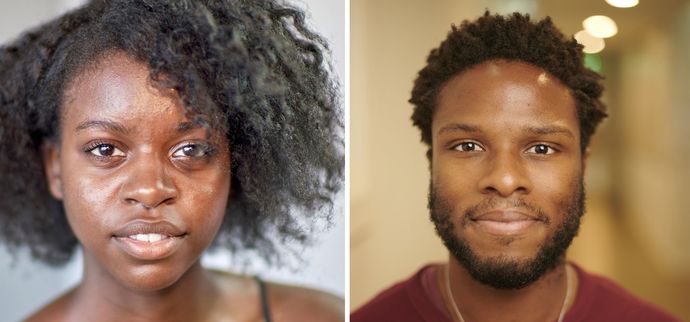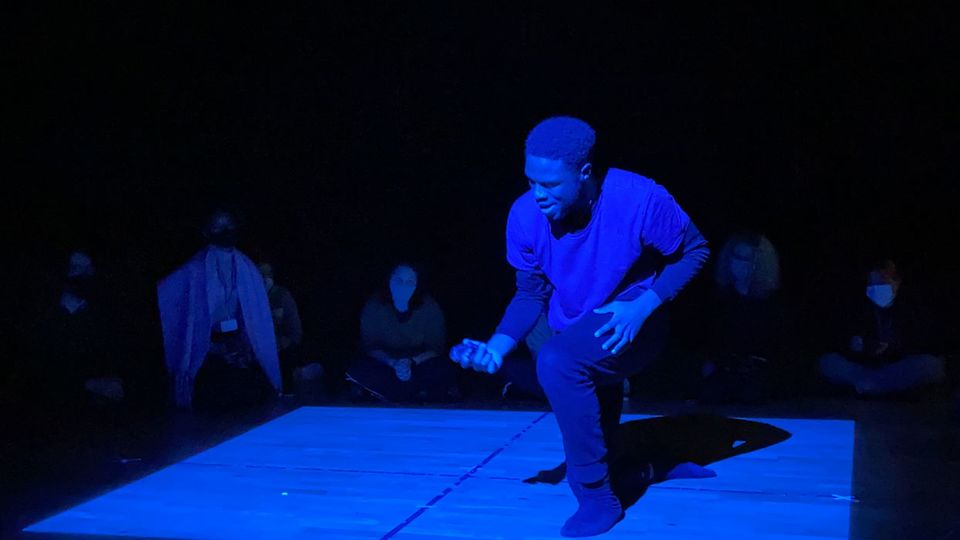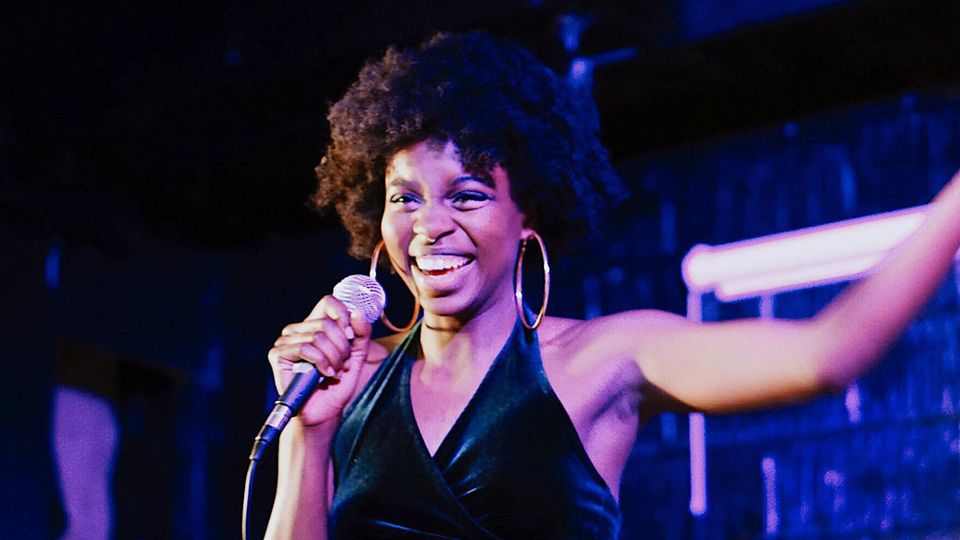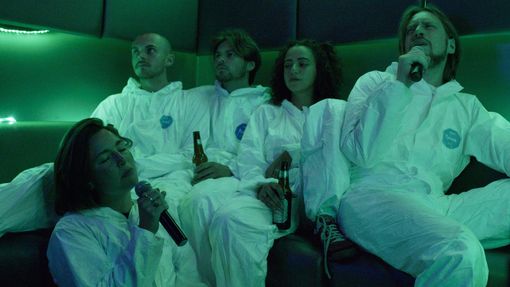
We spoke with Patrick Bayele and Esther Foga who co-founded The Avieli Arthouse, which was named as one of the winners of Central’s Enterprise Award 2022, and is a charity dedicated to promoting creative expression through innovative productions, workshops, and community outreach projects.
Patrick is a current student on Central’s MA/MFA Advanced Theatre Practice course, and Esther is a student at Associated Studios.
They discuss the impact of their first production, SOGYA: Pt. I, on the communities they serve. They also talk about how their studies at Central prepared them for this work and how being named as a finalist of Central’s Enterprise Award 2022 has helped them further their goals.
Can you tell us a little about The Avieli Arthouse, and what inspired you to start this project?
The Avieli Arthouse is named after Anthony Avieli Bayele, Patrick’s eldest brother, who passed away in November, 2012. Our charity commemorates his passion for creative expression, and his fearless approach towards pursuing his dreams. Anthony’s faith in his dreams is what inspires us to develop our Arthouse. We wish to carry his legacy forward through our innovative productions, co-creational workshops and community outreach projects, in both the U.K. and Ghana. By putting Christ at the centre of our creative process, we aspire to empower individuals and positively influence national policy.
What impact has The Avieli Arthouse been having on the communities and individuals that you work with?
Our inaugural production, SOGYA: Pt. I, the first part of an Afro-Epic WWII trilogy, (which is currently in research and development), has garnered enthusiastic support from the University of Ghana, the Veterans Administration of Ghana, the Royal Commonwealth Ex-Services League and the National Youth Theatre of Great Britain.
The project responds to the importance of heritage conservation, particularly in Northern Ghana, where the play is set. We have discussed the project with archaeologists and former civil servants, most of whom are from Northern Ghana. They have expressed their gratitude towards our story which sheds a light on these forgotten legacies, which have formed the foundation of the lives we live today. The Veterans Administration of Ghana have welcomed our project warmly and sincerely, as they wish to ‘perpetuate the memory’ of these Commonwealth soldiers. They have put us into contact with surviving Ghanaian WWII veterans, whom we have been meeting, to learn and document their testimonies.
The veterans are incredibly proud and touched to have their stories recognised and told, in the hope of these memories becoming timeless. We are also operating within some junior high schools in Ghana, raising awareness for disabilities in young people. This collaboration with Princess Marie Louise Hospital has proven fruitful, as young people have come up to us afterwards to share their experiences, and to thank us for our inclusive approach to learning, creativity and self-identity.

You were one of the winners of Central’s Enterprise Award 2022, how has this helped you to further your goals with The Avieli Arthouse?
Central’s Enterprise Award 2022 has truly kickstarted our mission by providing us with invaluable mentorship in business planning, financial strategy and the legal process of becoming a Charitable Incorporated Organisation. The StART team have provided us with the time and space to revise our ideas, to implement feedback on our proposals, and also, to think big!
Moving forward, we plan to invest our StART grant into the launch of our inaugural production, as well as our first season of workshops from autumn 2023 onwards, around the 78th anniversary of the end of WWII. We have also been accepted to present our research into SOGYA: Pt. I at the International Federation for Theatre Research conference in Accra, and the Performance Studies international conference in Johannesburg, both throughout July and August. We also plan to attend Panafest in Cape Coast; the Pan-African Theatre Festival. These ventures will provide an opportunity for us to continue our archival research, learn new practices for the project, and to sow the seeds of a rich, international community of practitioners, scholars, activists and diverse audiences.
How did your studies at Central help prepare you for your work?
Studies at Central have been indispensable for our work at The Avieli Arthouse. From the scenography, to audience participation, and most markedly, its research focus on ‘Performance Theology’, the essence of SOGYA: Pt. I was born directly from the practical experimentation and theoretical investigation that the course fostered. By participating in an MA Sustained independent Project (SIP), titled ‘Tunnel Vision’, performed at Camden People’s Theatre in September 2022, we expanded our creative production skills, and learned the importance of robust, communicative teamwork. These skills will prepare us for launching SOGYA: Pt. I in a variety of contexts, especially for our Theatre-In-Education tour, which is scheduled for 2024.
What does a typical working day look like for you at the moment?
Our working days consist of archival research at the Public Records and Archives Administration Department (PRAAD), and the J.H. Kwabena Nketia Archives at the University of Ghana (both in Accra), interviews with WWII veterans and academics, liaising with charitable organisations across education and public health to broker new partnerships, theoretical reading, scriptwriting, rehearsals and music composition, in the spirit of practice-as-research.
We fit as much of this as we can into one day! We’re working separately in both Ghana and London, so check-in twice a week virtually to update each other on developments, and to catch up on tasks.

Can you share some of the biggest challenges you faced in launching and growing The Avieli Arthouse in both Ghana and the UK?
Learning to maintain a steady pace, and to set realistic targets, have been the biggest challenges we have faced. Facing these challenges taught us crucial lessons in time management and task-prioritisation, as we juggle our charitable aims with our student commitments. We have also learned how imperative it is to have as much prep-work done in advance of travelling internationally. Seeing as our time visiting Ghana is limited, making contact with the relevant practitioners, cultural institutions and authorities is key to hit the ground running and to sustain the momentum of the project.
As this project is currently in-development as an MFA SIP, we are adhering to the Central Research and Ethics Integrity framework in conducting our research. The Ethics processes involved in this require very careful attention and implementation of feedback. Completing all of this preparation in advance would have saved us much more time on-the-ground, but as with all lessons, we will be in a much better position the next time we embark upon international research and development. All things considered, we have taken these challenges in our stride, and with each misstep, we climb towards a new strength.
What advice do you have for other entrepreneurs and individuals looking to make a positive impact in their communities through art and creativity?
Our StART journey has been a path of trial and error, yet each trial has deepened our commitment to our project, and also to each other as partners. The importance of research cannot be stressed enough; knowing your audience, and cultural organisations who are working towards similar aims, will not only instil within you the confidence to ‘Just do it!’, but provide you with the critical perspective to know how your project stands out and does things differently, thereby illuminating new ways to interact with and develop communities. In carrying out this research, put yourself forward for those opportunities which can develop your skills, or introduce you to key individuals and organisations who you can bond with and work alongside.
From free masterclasses at places like the Almeida Theatre, to Cultural Conversations at the Barbican, or co-working at the Roundhouse Workspace, there are low-cost/free opportunities out there which will actively create ‘right places’ and ‘right times’. Whilst you are out there seeking opportunities, take joy in exploring and creating your own opportunities. From experimenting with poetry in a small journal, writing that monologue inspired by a conversation you heard on a train, or recording some lyrics on a phone; every time you try something out, even if you are ‘not sure who would like it’, that’s one step towards sharing a piece of art, that could then inspire someone else to take that first step. In so doing, you inspire yourself to keep taking those risks with your talent.
‘Networking’ can be a bit of an uncomfortable phrase; think ‘community-building’ and ‘bond-making’ to take the pressure off ‘making contacts’ and to put the focus on ‘developing possibilities’. These creative endeavours require the support and the belief of mentors who are climbing the mountains which you are about to embark upon. A mentor being an individual(s) with experience in the relevant field, who is willing to open up their communities, invest their resources, share their expertise, and most importantly, give you their time to realise the vision. They can troubleshoot your proposals, save you from making preventable errors, keep you on track for deadlines, and help your project fold into our wider cultural landscape. They can be hard to come by, however there are various resources on your side to make the mentor-searching process easier, such as social media, live talks and online masterclasses which they facilitate. You’d be surprised at how a potential mentor may react positively to your proposal; there may be a mentor out there who has been waiting for years to support a project like yours!
Underneath all of this, there should be a strong conviction, a solid case, and an unwavering hope in how your project can change or even heal lives. With hope comes bravery, and bravery is the first breath we must take to ‘Just do it!’
And finally, how can people find out more about The Avieli Arthouse?
Please do drop us a line and say ‘Hi’ to us via our email, avieliarthouse@gmail.com. We’d love to hear from you! We will build our social media presence over the summer with an Instagram page and a website but in the meantime please email us and we will add you to our mailing list, where you will receive our monthly newsletters which contain exciting updates on our progress.

